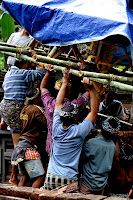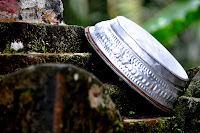 Just when I think we are on our way home, the children are asleep in the way back seat, the car slows to turn into a lonely road. We’re in the middle of jungle. No one’s said anything to me. It’s just assumed that I’m also planning on spending the rest of the day--with them--at Ruma Oka. In the games I play with my mind to remember strange words: ruma oka is one that sticks. The house of Oka.
Just when I think we are on our way home, the children are asleep in the way back seat, the car slows to turn into a lonely road. We’re in the middle of jungle. No one’s said anything to me. It’s just assumed that I’m also planning on spending the rest of the day--with them--at Ruma Oka. In the games I play with my mind to remember strange words: ruma oka is one that sticks. The house of Oka.  On a lumpy, muddy road, we drive slowly,but still bounce up and down, while squeezing between narrow and steep mossy rock walls with the car mirrors tucked in. Up the stairs into the compound. It’s simple, well-worn, and dirt-covered. Past pens of ducks and pigs, chickens scratch the bare ground in front of the house, laundry hangs to dry, and sun flits through the spaces between rambutan and manga trees. Roosters for fighting crow from straw cages.
On a lumpy, muddy road, we drive slowly,but still bounce up and down, while squeezing between narrow and steep mossy rock walls with the car mirrors tucked in. Up the stairs into the compound. It’s simple, well-worn, and dirt-covered. Past pens of ducks and pigs, chickens scratch the bare ground in front of the house, laundry hangs to dry, and sun flits through the spaces between rambutan and manga trees. Roosters for fighting crow from straw cages.  Barefoot kids dart between sunshine and shadow. A lone motor bike guards the small family rice field. Two small buildings are joined by a traditional Indonesian kitchen. No stove, no gas. But a coconut-husk fed fire that has blackened the walls and contents of the kitchen with soot. Anni shows it off – great taste here, not like the gas stove. In the corner fresh, dark blood spills from a board, and pools on the ground. It was probably a chicken.
Barefoot kids dart between sunshine and shadow. A lone motor bike guards the small family rice field. Two small buildings are joined by a traditional Indonesian kitchen. No stove, no gas. But a coconut-husk fed fire that has blackened the walls and contents of the kitchen with soot. Anni shows it off – great taste here, not like the gas stove. In the corner fresh, dark blood spills from a board, and pools on the ground. It was probably a chicken. Oka sits, dressed in white (a stark contrast to the drab surroundings) watching the day, cross-legged on the long covered porch, smiling. He welcomes us
 and instructs me to sit with him as his wife brings out three plates of fruit and coffee. I try to eat, because I know it’s expected, but I am so full I can hardly stand the tie around my waste anymore (that and the pig incident has left my stomach just a little queezy still). I appease them with sips of strong copi (coffee). Then the coconuts (colapa muda) are brought out. Oka hacks them open and inserts a straw for me to taste it. His wife teaches me to say “rasmana manis” (those are sweet). Then I learn the names of more fruit as Oka’s tiny grand daughter points her brother’s camera at me to take pictures of me making silly faces. The kids run around the yard. Newly wed sister, in a sparkling kabayah, chases them and picks them up, for hugs and kisses against their will. Everyone laughs. The boy who’s picked on the most, but who has the best joking demeanor, finally hides behind the farthest wall of the compound and starts to sing.
and instructs me to sit with him as his wife brings out three plates of fruit and coffee. I try to eat, because I know it’s expected, but I am so full I can hardly stand the tie around my waste anymore (that and the pig incident has left my stomach just a little queezy still). I appease them with sips of strong copi (coffee). Then the coconuts (colapa muda) are brought out. Oka hacks them open and inserts a straw for me to taste it. His wife teaches me to say “rasmana manis” (those are sweet). Then I learn the names of more fruit as Oka’s tiny grand daughter points her brother’s camera at me to take pictures of me making silly faces. The kids run around the yard. Newly wed sister, in a sparkling kabayah, chases them and picks them up, for hugs and kisses against their will. Everyone laughs. The boy who’s picked on the most, but who has the best joking demeanor, finally hides behind the farthest wall of the compound and starts to sing.  Maybe six years old, his soft voice, like tissue paper, sometimes rips and tears on the high notes – it’s sweet, light and beautiful. The other kids join in at parts, he gains confidence then sings at the top of his lungs. The only word I understand: “My darrrrrling!
Maybe six years old, his soft voice, like tissue paper, sometimes rips and tears on the high notes – it’s sweet, light and beautiful. The other kids join in at parts, he gains confidence then sings at the top of his lungs. The only word I understand: “My darrrrrling!  My darling!” Everyone laughs. I join in for reasons of my own: I’m in Bali, sitting cross-legged in the family compound of the descendent of an Indonesian king, sharing new words with his family and children. Three weeks ago, I was working in a coffee shop, in Seattle.
My darling!” Everyone laughs. I join in for reasons of my own: I’m in Bali, sitting cross-legged in the family compound of the descendent of an Indonesian king, sharing new words with his family and children. Three weeks ago, I was working in a coffee shop, in Seattle.  Nothing much happens. Just a series of simple minutes, that drift into hours. A lazy afternoon with a group of strangers-turned-family, like all the others. This is Indonesia, they tell me, as we sit and peel rumbutan and mangiis. Eating, sharing, talking Indonesian. Jokes and smiles and gossip is traded. Kids play. I snap photos as they correct my Indonesian. Then lean back, imagine what it would be like to have grown up here, and let myself whither after long hours in the sun. Oka drives me home, escorts me back to the gate. I thank him many times for honoring me with a visit to his house. He is pleased and wants to take me to new Indonesian places tomorrow or the day after next, or after that? I am so worn out again from so many busy days. I know I need to rest, work, and after being surrounded by a pool of such fabulous people, so constantly: I feel the need for some serious down time. (So American, but it’s what my heart and mind are now yearning for.)
Nothing much happens. Just a series of simple minutes, that drift into hours. A lazy afternoon with a group of strangers-turned-family, like all the others. This is Indonesia, they tell me, as we sit and peel rumbutan and mangiis. Eating, sharing, talking Indonesian. Jokes and smiles and gossip is traded. Kids play. I snap photos as they correct my Indonesian. Then lean back, imagine what it would be like to have grown up here, and let myself whither after long hours in the sun. Oka drives me home, escorts me back to the gate. I thank him many times for honoring me with a visit to his house. He is pleased and wants to take me to new Indonesian places tomorrow or the day after next, or after that? I am so worn out again from so many busy days. I know I need to rest, work, and after being surrounded by a pool of such fabulous people, so constantly: I feel the need for some serious down time. (So American, but it’s what my heart and mind are now yearning for.) I smile, Ya, ya nanti, nanti… Saya kerja! (Yes, yes, but later, later….I work now!)






















































